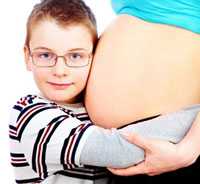Alcohol and Pregnancy Questions and Answers

Q: I just found out I am pregnant. I have stopped drinking now, but I was drinking in the first few weeks of my pregnancy, before I knew I was pregnant. What should I do now?
A: The most important thing is that you have completely stopped drinking after learning of your pregnancy. It is never too late to stop drinking. Because brain growth takes place throughout pregnancy, the sooner you stop drinking the safer it will be for you and your baby.
If you drank any amount of alcohol while you were pregnant, talk with your child’s health care provider as soon as possible and share your concerns. Make sure you get regular prenatal checkups.
Q. What is a “drink”? What if I drink only beer or wine coolers?
A: Drinking any type of alcohol can affect your baby’s growth and development and cause FASDs. This includes all wines, beer, and mixed drinks. A standard drink is defined as .60 ounces of pure alcohol. This is equivalent to one 12-ounce beer or wine cooler, one 5-ounce glass of wine, or 1.5 ounces of 80 proof distilled spirits (hard liquor). Some drinks, like mixed alcoholic drinks or malt liquor drinks, might have more alcohol in them than a 12-ounce beer. There is no safe kind of alcohol. If you have any questions about your alcohol use and its risks to your health, talk to your health care provider. You can also visit CDC’s website on alcohol.
Go to the Information for Women page for a picture of the types of standard-sized drinks and the amount of alcohol they contain.

Q: Is it okay to drink a little or at certain times during pregnancy?
A: There is no known safe amount of alcohol use during your pregnancy or when you are trying to get pregnant. There is also no safe time to drink when you are pregnant. Alcohol can cause problems for your developing baby throughout your pregnancy, including before you know you are pregnant.
FASDs are completely preventable if a woman does not drink alcohol during pregnancy—so why take the risk?
Q: I drank wine during my last pregnancy and my baby turned out fine. Why shouldn’t I drink again during this pregnancy?
A: Every pregnancy is different. Drinking alcohol might affect one baby more than another. You could have one child who is born healthy and another child who is born with problems.
Q: If I drank when I was pregnant, does that mean my baby will have an FASD?
A: If you drank any amount of alcohol while you were pregnant, talk with your child’s health care provider as soon as possible and share your concerns.
You may not know right away if your child has been affected. FASDs include a range of physical and intellectual disabilities that are not always easy to identify when a child is a newborn. Some of these effects may not be known until your child is in school.
There is no cure for FASDs. However, identifying and intervening with children with these conditions as early as possible can help them to reach their full potential.
Q: Is it okay to drink alcohol if I am trying to get pregnant?
A: You might be pregnant and not know it yet. You probably won’t know you are pregnant for up to 4 to 6 weeks. This means you might be drinking and exposing your baby to alcohol without meaning to.
Alcohol use during pregnancy can also lead to miscarriage and stillbirth.
The best advice is to stop drinking alcohol when you start trying to get pregnant.
Q: Why should I worry about alcohol use if I am not pregnant and not trying to get pregnant?
A: If you drink alcohol and do not use contraception (birth control) when you have sex, you might get pregnant and expose your baby to alcohol before you know you are pregnant.
Nearly half of all pregnancies in the United States are unplanned. And many women do not know they are pregnant right away. So, if you are not trying to get pregnant but you are having sex, talk to your health care provider about using contraception consistently.
Q: If a woman has an FASD, but does not drink during pregnancy, can her child have an FASD? Are FASDs hereditary?
A: FASDs are not genetic or hereditary. If a woman drinks alcohol during her pregnancy, her baby can be born with an FASD. But if a woman has an FASD, her own child cannot have an FASD, unless she drinks alcohol during pregnancy.
Q: Can a father’s drinking cause harm to the baby?
A: How alcohol affects the male sperm is currently being studied. Whatever the effects are found to be, they are not fetal alcohol spectrum disorders (FASDs). FASDs are caused specifically by the mother’s alcohol use during pregnancy.
However, the father’s role is important. He can help the woman avoid drinking alcohol during pregnancy. He can encourage her to abstain from alcohol by avoiding social situations that involve drinking. He can also help her by avoiding alcohol himself.

Q: I’ve tried to stop drinking before, but I just couldn’t do it. Where can I get help?
A: If you cannot stop drinking, contact your doctor, local Alcoholics Anonymous, or local alcohol treatment center.
Behavioral Health Treatment Services Locator
The Substance Abuse and Mental Health Services Administration (SAMHSA) has a treatment facility locator. This locator helps people find drug and alcohol treatment programs in their area.
Alcoholics Anonymous (A.A.)
Alcoholics Anonymous® is a fellowship of men and women who share their experience, strength and hope with each other that they may solve their common problem and help others to recover from alcoholism. Locate an A.A. program near you.
Q: I suspect my child might have an FASD. What should I do?
A: If you think your child might have an FASD, talk to your child’s doctor and share your concerns. Don’t wait!
If you or the doctor thinks there could be a problem, ask the doctor for a referral to a specialist (someone who knows about FASDs), such as a developmental pediatrician, child psychologist, or clinical geneticist. In some cities, there are clinics whose staffs have special training in diagnosing and treating children with FASDs. To find doctors and clinics in your area in your area visit the National and State Resource Directory from the National Organization on Fetal Alcohol Syndrome (NOFAS).
At the same time as you ask the doctor for a referral to a specialist, call your state’s public early childhood system to request a free evaluation to find out if your child qualifies for intervention services. This is sometimes called a Child Find evaluation. You do not need to wait for a doctor’s referral or a medical diagnosis to make this call.
Where to call for a free evaluation from the state depends on your child’s age:
- If your child is younger than 3 years old, contact your local early intervention system.
Find your state’s early intervention contact information here.
Learn more about early intervention » - If your child is 3 years old or older, contact your local public school system.
Even if your child is not old enough for kindergarten or enrolled in a public school, call your local elementary school or board of education and ask to speak with someone who can help you have your child evaluated.
Learn more about this process »
- Page last reviewed: October 24, 2016
- Page last updated: October 24, 2016
- Content source:



 ShareCompartir
ShareCompartir